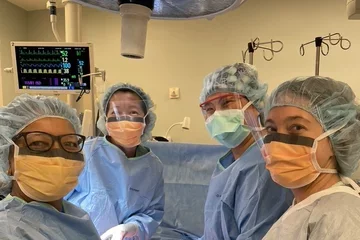Where to Live While in Med School at UCLA
UCLA Medical School Student Life

Knowing Your Housing Priorities Will Help Narrow Down Your Options
For new students in the David Geffen School of Medicine at UCLA, deciding where to live in med school is the first step to making a new home. Joe Torres, a third-year student, recalls the move to Los Angeles with his pregnant wife and looking for a place to start their new family while he started his first semester. Their primary considerations: price and proximity.
"I wanted to be close enough to school to take a bus or have a short drive," he says. "My wife would be staying home with our child, so she needed to be close to parks and shopping areas. We looked at many places — most of them were really expensive and not very clean. Then we heard about university family housing, which was a great deal."
They chose the University Village, one of two UCLA-owned apartment complexes for married students. Torres and his wife are now apartment coordinators and help to manage the complex during evenings and weekends.
Here, he shares insight into where to live in med school at UCLA, for both single students and those with families coming with them.
On or Off Campus?
According to Torres, most medical students live in university housing during the first couple of years. "Probably 90 percent of first-year students live at Weyburn, which is graduate housing for single students located right next to campus."
Torres warns that proximity comes at a price, though. "The closer you to live to school, the more you pay," he explains. "My friends who live on campus pay nearly as much for a one-bedroom studio as we pay for a two-bedroom apartment."
There are also several university-owned apartment complexes for graduate students, located five to 10 miles off campus.
"Especially in LA, where traffic can be really bad, most students don't want to be far from school," Torres says. "The commute could take hours from your week and study time. The University Village is about five miles from school so it only takes about 15 minutes to get there."
University Housing or Privately Owned Residence?
Torres says there are many benefits to university housing. For his family, cost and convenience were the deciding factors. "Right across the street from us, there's a privately owned complex where rent for a one-bedroom is around $2,100," Torres observes. "A two-bedroom here is around $1,450. Plus, there are bus lines running constantly to the school."
Other students choose to live in privately owned residences. "Some want to be on their own," he explains. "Some want to live in a standalone house with a yard, or they want pets, which aren't generally allowed in university housing unless they're service animals. And if you don't mind living with several roommates, sometimes it can be cheaper."
Single, Married or Full Family?
Housing eligibility for university-owned apartment complexes varies based on marital status and whether students have children. Torres and his wife have had two children during his time in med school. Having a family is one reason he enjoys living in university housing.
"There's a daycare center here and an elementary school within walking distance," he says. "There are playgrounds and common areas, and it's nice having that sense of community. There are lots of international families, and sometimes it's really isolating for them. But when you have a little kid playing with someone else, it's a good icebreaker for the parents, and you form friendships with other families in the same situation as yours."
For more student perspectives on where to live, check out the medical student guidebook — a valuable resource on life at UCLA contributed to by its very own medical students.
(Related Article: 5 Suburbs of Los Angeles That Are Near UCLA)



